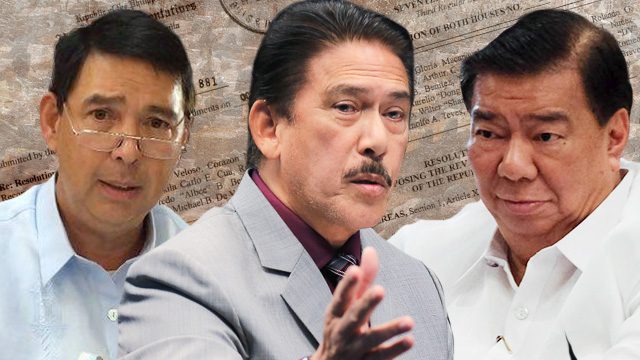SUMMARY
This is AI generated summarization, which may have errors. For context, always refer to the full article.

MANILA, Philippines – Top Senate leaders on Tuesday, October 9, rejected the draft charter of former president and Speaker Gloria Arroyo, saying time was running out under the 17th Congress.
Senate President Vicente Sotto III, Senate President Pro-Tempore Ralph Recto, and Minority Leader Franklin Drilon all said there was simply no time to discuss federalism or charter change.
“We don’t have time to even talk about it,” Senate President Vicente Sotto III said in a text message to reporters, when asked about the House’s draft constitution.
“Why do you think so much of that? I don’t think anything will happen to that…. Wala na, patay na ‘yung federalism na yan, patay na yung cha-cha. Next Congress na pag-usapan yan. Wala na ‘yan, futile (Federalism is already dead, cha-cha is already dead. They should talk about it in the next Congress. It’s nothing now, it’s futile),” Recto said in an interview.
“It’s dead on arrival…simply because we have no more time. Even looking at the merits, of which I have very serious reservations personally, I don’t find the proposal logical. I’m sure they realized there is simply no time. It doesn’t take rocket science to realize that,” Drilon told reporters.
Arroyo’s proposal has no counterpart in the Senate. What had been pending in the chamber is a resolution calling for a separate voting of a Constituent Assembly, which has no counterpart in the House.
Drilon said that before going into the details of the revisions, Congress has to decide first whether or not to amend the Constitution and which mode to do it.
Line of succession issues
Sotto is set to benefit from Arroyo’s draft federal constitution as it puts the Senate President – not Vice President Leni Robredo – as President Rodrigo Duterte’s successor should he fail to lead the country during the transition government.
The proposal also removes the two-term limit for senators and a 3-term limit for district and party-list representatives.
Asked about being a beneficiary, Sotto said in jest: “We don’t even know if I’m still SP (Senate President) by then.”
Drilon, a former Senate president, refuted the claim of House committee on constitutional amendments chairman Vicente Veloso that choosing Sotto over Robredo would avoid the threat of “instability” over the electoral protest filed against her.
“The Senate President is subject to election and change anytime by the 23 senators…. Precisely if they want to achieve stability, the stability is to follow the rule of succession; otherwise there will be instability, because the Senate President can be replaced anytime,” Drilon said.
Congress is set to adjourn on October 13 until November 11, in time for the filing of the Certificates of Candidacy for the 2019 polls. They will resume session for a month, from November 12 to December 14. By then, senators are expected to be busy with 2019 budget deliberations and approval.
After Christmas and New Year, Congress will briefly hold session from January 14 to February 8, just before the start of the 2019 campaign. A recess will follow from February 9 until May 19, or the election season.
If Arroyo’s proposal is not passed in the current Congress, it would have to be refiled in the 18th Congress, which starts in July 2019. – Rappler.com
Add a comment
How does this make you feel?
There are no comments yet. Add your comment to start the conversation.